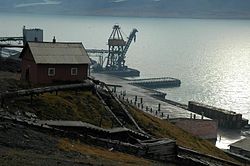
Barentsburg (Баренцбург) is the only remaining Russian settlement in Svalbard.
Understand
Barentsburg is named after Dutch explorer Willem Barentsz, who discovered Svalbard in 1596. The Svalbard Treaty of 1920 gave the previously unclaimed islands to Norway but allowed any country to perform mining and other economic activity. The Russian state-owned Trust Arktikugol has been mining coal here since 1932, and during the Cold War Barentsburg was a hotbed of activity as the Russians attempted to expand their zone of control over the islands. After Pyramiden was closed in 1998, Barentsburg has been the only Russian settlement still operating, with some 470 inhabitants as of 2015, and some 100,000 tons of coal exported yearly. The mine closed in 2006 after concerns about the risk of an underground fire, but resumed production in late 2010.
The settlement used to be home to over 1,000 people, so many buildings are no longer inhabited, and some are left to decay. It has a truly stunning setting. When the weather is clear enough to see across the Isfjord, and the black smoke rises from by the old coal power plant, the visit will leave a strong impression on the few who visit.
Orientation
Orienting yourself in Barentsburg is easy. It's some 220 steps up the stairs from the dock to the settlement, where more or less everything is along the main street, ulitsa Ivana Starostina.
Get in

By air
Barentsburg has a heliport operated by the Russian company SPARK with one Mi-8 helicopter. Trust Arktikugol can only use the helicopter service within the limits of its activities as a mining company, and chartered tourist transport is not permitted. The flight between Longyearbyen Airport and Barentsburg is about 15 minutes. The heliport is located around 4 km from Barentsburg. There is a road there where a minibus transports the travellers.
By sea
Most visitors arrive from Longyearbyen on daytrips (2–3 hours one way by boat). In summer, there are also occasional cargo and passenger boats to Murmansk on the Russian mainland (3 days).
By foot
There are no roads to Barentsburg, and it's two days' solid hiking from Longyearbyen to Barentsburg in the summer. The easiest way (starting from Longyearbyen) is to head off from the end of the road in Björndalen, go up on the mountain of Fuglefjella, continue past the valley of Grumant and descend to the coast along a small creek after 2-3 km. The hike should take about 6–7 hours. The night can be spent in either the Rusanov cabin outside of the old mining settlement of Coles Bay (closed in 1962) or in one of the buildings of Coles Bay (recommended in summer only). The next day is a slightly longer hike (7–9 hours), but in flat terrain, crossing the Coles Valley and continuing along Kapp Laila before arriving the heliport at Heerodden outside Barentsburg. There is a road from Heerodden to the settlement itself.
By snowmobile
In winter, travel by snowmobile is a more popular option and day trips are offered by tour operators in Longyearbyen — it's a fantastic ride and well recommended.
Get around

Barentsburg is easily covered on foot.
Talk
Russian and Ukrainian are the main languages, spoken by the majority of the population. Government officials speak Norwegian.
See



Day-tripping tourists get about 2 hours to see the sights, and for most this is plenty.
- 1 Chapel. A small orthodox wooden chapel, erected in 1996 to commemorate the 140 victims of a plane that crashed while bringing in a new shift of miners to Barentsburg.
- 2 Lenin statue. It may be only the world's second most northernly statue of Lenin (the top spot still belongs to Pyramiden), but it's still a popular spot to take a picture.
- 3 Pomor Museum, ☏ 47 79 021814. Stuffed polar bears, a dinosaur footprint and lots of rocks. Entry 50 kr.
- 4 Star and slogan. Look up on the hillside above Barentsburg — there's a five-pointed star and the Communist-era slogan Миру Мир/Miru Mir, or "Peace to the World". The sign also serves a useful function during winter, as when the star becomes visible again, the polar night has ended and summer is coming.
Do
- Sport Hall. Two sea water swimming pools and assorted other sports facilities. Also used for competitions with Longyearbyen
Buy
The Norwegian currency kroner is used in Barentsburg, and prices for tourist activities are adjusted to Norwegian levels.
- Polar Star (in the cultural center). Souvenir shop offering matryoshka dolls, Lenin pins and assorted other Soviet-Russian kitsch.
Eat
Locals eat cabbage soup (shchi) in their canteen for free, but tourists will normally be limited to meals at the hotel (30-70 kr).
The Cafe-Bar 78 Parallel, in the canteen building right on top of the stairs leading to town is closed for restoration work.
Drink
The hotel's bar serves up Russian vodka, cognac and champagne.
Sleep

There is one public accommodation option.
- 1 Barentsburg Hotel, ☏ 47 79 021814. Built in 1988 and in fairly good shape. Double rooms from 550 kr.
Connect
The Barentsburg Hotel has a post office for sending mail. It's a branch of the Longyearbyen post office and thus uses Norwegian stamps (and Norwegian prices), but they do have their own postmark.
There is a small Russian consulate on Barentsburg, which could theoretically issue you a Russian visa. Don't count on it though, certainly not without checking ahead. A Russian visa application is a complicated process, and you can't just show up to get one. For example, you need a confirmed and paid hotel booking before applying.
